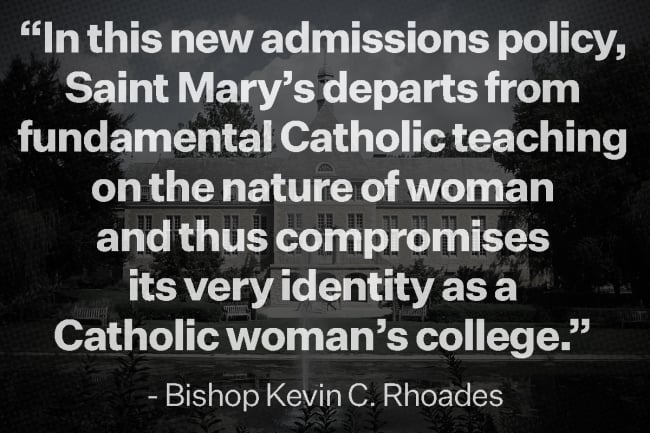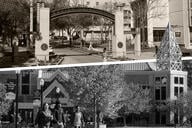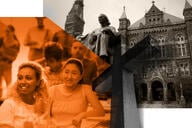You have /5 articles left.
Sign up for a free account or log in.

Bishop Kevin Rhoades released his statement on Nov. 27.
Photo illustration by Justin Morrison/Inside Higher Ed | Wikimedia commons/Jaknelaps
The leaders of Saint Mary’s College, a Catholic women’s institution in Indiana, recently became embroiled in a controversy after a local bishop publicly criticized them for deciding to consider transgender women applicants for admission.
The policy decision was made by the college’s Board of Trustees in June, but the policy was not widely known until Kevin Rhoades, the bishop of Fort Wayne–South Bend, learned about it last month and publicly denounced it, prompting a backlash against the college by some alumnae and others.
The board voted to amend the college’s nondiscrimination policy to allow applications from undergraduates “whose sex is female or who consistently live and identify as women.” The new policy is set to take effect in fall 2024.
Rhoades read the news in The Notre Dame Observer, a student newspaper, which reported on the decision on Nov. 21. He issued a statement on Nov. 27 condemning the decision and urging the board to “correct its admissions policy in fidelity to the Catholic identity and mission it is charged to protect.”
“The desire of Saint Mary’s College to show hospitality to people who identify as transgender is not the problem,” Rhoades wrote. “The problem is a Catholic woman’s college embracing a definition of woman that is not Catholic.”
He added that it was “disappointing” that “he was not included or consulted on a matter of important Catholic teaching.” He also noted that “In this new admissions policy, Saint Mary’s departs from fundamental Catholic teaching on the nature of woman and thus compromises its very identity as a Catholic woman’s college.”
Rhoades’s statement followed an earlier email sent by St. Mary’s president, Katie Conboy, on the same day the article was published in the student newspaper, to faculty, students and staff saying she was “pleased” by the board’s decision.
Conboy responded to Rhoades’s comments with a second statement to the campus saying that she and Sister M. Veronique, president of the Sisters of the Holy Cross, the congregation that founded St. Mary’s, met with the bishop shortly after his public comments. She noted that they would be “continuing dialogue to discern and learn more about his concerns” and that “our next steps will be informed both by the input we have received and by our ongoing dialogue.”
Conboy declined interview requests from Inside Higher Ed through her spokesperson, who would only provide Conboy’s two public statements about the policy change and the meeting with the bishop. Rhoades’s office did not respond to multiple requests for comments.
Joining the Trend
As one of eight Catholic women’s colleges and one of 30 women’s colleges in the U.S., Saint Mary’s is not the first to amend its nondiscrimination policy to be more inclusive of transgender and/or nonbinary students.
Mills College in California and Mount Holyoke College in Massachusetts were among some of the first women’s institutions to modify their admissions policies, doing so in 2014. St. Catherine University in Minnesota was one of the first Catholic women’s colleges; it did so in 2018. All eight of the Catholic colleges now admit trans women; Saint Mary’s is the last to do so.
Over all, at least 22 women’s colleges have amended their policies, according to a list compiled by Campus Pride. However, the policies vary in language, with only some directly addressing nonbinary individuals and/or students who identify as women at the time of admission but transition to masculine gender identities while in college.
“The revised policy demonstrates our commitment to providing an inclusive environment that responds to the needs of all women,” Conboy wrote in her letter to the campus.
She also noted the formation of a President’s Task Force for Gender Identity and Expression earlier in the year, “charged with gathering information and best practices from other Catholic colleges and women’s colleges” and presenting “recommendations on student housing considerations, as well as on community education around both Catholic identity and women’s college identity,” she wrote.
Saint Mary’s students and alumnae had mixed reactions to the new policy, and some shared their thoughts on Instagram.
“I love seeing my Alma mater live up to its Catholic values of loving ALL people and valuing ALL lives. Never been more proud of Saint Mary’s,” Colleen Kross Kollasch wrote on the platform.
“I’m highly disturbed at your new policy,” alumna Emma Panowicz wrote. “My family will not be attending smc any more. Or promoting it. Take the word ‘Catholic’ out of the mission statement.”
Caroline Dutton, a junior at the college, seemed to view the decision as living up to the institution’s values and mission.
“SMC was founded to educate women who were overlooked or excluded in traditional education environments and trans women can surely relate to that,” she wrote.
Gail Porter Mandell wrote to the editor of The South Bend Tribune, recalling a similar issue that “caused a firestorm" when she was a student at Saint Mary’s 60 years ago.
Mandell said many people back then considered it “unnatural" to educate students of different races together, and she recalled a single bishop who supported the college’s decision to admit its first Black student.
“I pray that our bishop, echoing another long ago, may eventually find it possible to say to President Katie Conboy and Saint Mary’s, ‘Stick to your guns,’’ she wrote.
Priscilla Pilon took to Facebook to say she was removing Saint Mary’s as a beneficiary in her will.
“I, for one, wrote to the college to express my disappointment and have publicly stated that not one more dime, nor my advocacy for the college will continue unless they reverse this course,” Pilon wrote.
Joseph Strickland, who recently was removed as the bishop of the diocese of Tyler, Tex., commended Rhoades on X.
Jonathan Coley, an Oklahoma State University professor who has studied how Catholic and Christian institutions are addressing LGBTQ+ issues and responding to students who identify as members of that community, said Catholic colleges nationwide are becoming more inclusive, particularly in comparison to Protestant colleges.
“Because transgender issues have become a hot topic in our political discourse and there has just been increasing consciousness about issues facing trans and nonbinary people in the United States,” Coley said, “a lot of Christian colleges and universities are responding either by adopting more inclusive policies or more discriminatory policies.”
Just over 70 percent of Catholic institutions promote inclusive policies for gender identity, compared to 42 percent of Protestant institutions, according to Coley’s research. He noted that only 4 percent of Catholic colleges and universities have a formal ban on gender transition, compared to 28 percent of Protestant institutions.
Coley said his research found that more colleges have publicly taken a stance on LGBTQ+ issues than a decade ago. Only 10 percent of Christian colleges and universities addressed gender identity in their student handbooks, and none had introduced formally discriminatory bans in 2013, when he first started his research.
Finding a Path Forward
The Reverend Dennis Holtschneider, president of the Association of Catholic Colleges and Universities, said how Catholic educators should approach sexual orientation and gender identity policies is a “controverted” question. He pointed to a similar situation, also in Indiana, in 2019, when a different bishop demanded two Indianapolis high schools fire gay staff members or lose formal recognition as Catholic institutions. Leaders at one of the schools complied and fired a gay teacher; administrators at the other school refused to do so.
Father Holtschneider said that if Saint Mary’s moves forward with its policy and disregards the bishop’s opposition, it would “get really complicated really fast.” He noted that although Saint Mary’s administrators report to the Sisters of the Holy Cross—who have not released a statement for or against the board’s decision—they also regularly work with the bishop.
“So that relationship is important,” Father Holtschneider said.
Patricia McGuire, president of Trinity Washington University, which has a women’s undergraduate program, said most Catholic colleges operate as a corporation independent of their local dioceses, and therefore the local bishop can’t influence internal governance of the institution. She noted, however, that the bishop could try to penalize the college in other ways.
“I don’t know that it would rise to that level,” she said. “The stakes are very high.”
Although Trinity never formally established a policy on gender identity, McGuire said the institution has long welcomed trans students. In her view, limiting women’s colleges to “biological women” is “old-fashioned” and does not align with Catholic teachings.
“This rigid definition of a women’s college is something we should have left in the 20th century,” she said. “It’s a devastating concept to say that a person may not benefit from the fruits of a good Catholic education because of who they are.”
As more Catholic colleges have discussions about these issues, Father Holtschneider said his association encourages them to approach these matters from an academic perspective through research and discussion.
“We’ve also encouraged them to be kind and welcoming,” Father Holtschneider said. “These are humans, our brothers and sisters. They’re God’s children. And it’s appropriate that we treat people with all the kindness that we would want to be treated.”
He added that the association’s approach is “pretty consistent” with the recent words and actions of Pope Francis, who made headlines in November for having lunch with a group of trans women in a seaside town south of Rome.
“Tutte, tutte, tutte, everyone, everyone, everyone is welcome,” Father Holtschneider said, quoting the pope.




